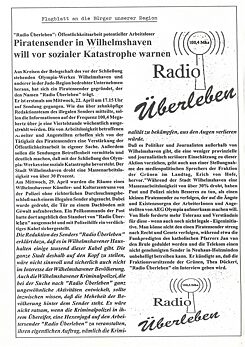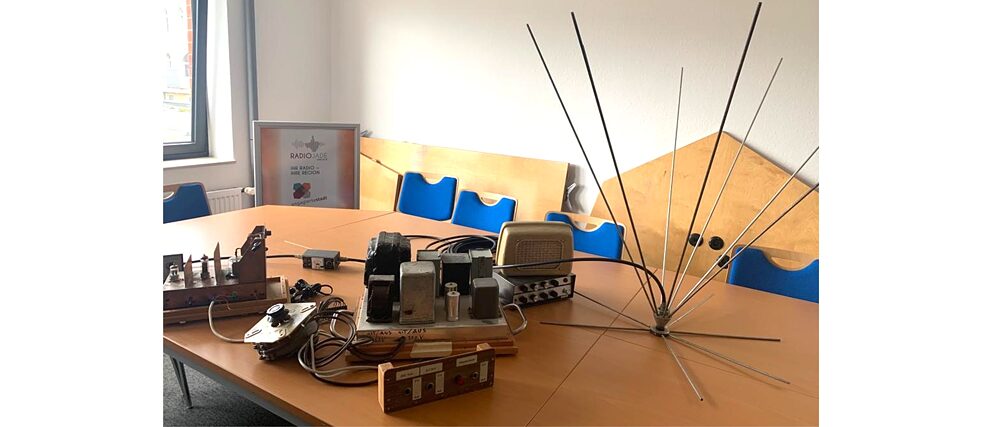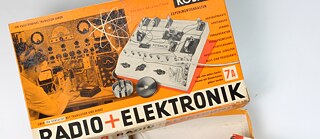East Frisia On the Pirate Waves

Playing some different music for a change, broadcasting alternative political content or fooling around on the airwaves – why were there so many pirate radio stations in East Frisia, of all places?
Moors, dykes, mudflats and stiff breezes: East Frisia abounds in natural beauty. The region is one of Germany’s most sparsely populated areas, which is why life in this western corner of Lower Saxony has always tended to be a bit more laid-back and low-key. This could hardly be said about the local radio scene in the 1970s, 1980s and 1990s, however. East Frisia was a stronghold for pirate radio stations, or “piróótje” as they are known in the local Low German dialect. A number of stations with names such as “Radio Acapulco”, “Radio Power Play”, “Radio Butterfly”, “Radio Bonanza” or “SturmWellenSender Radio SWS” used radio frequencies for their illegal broadcasts.
Annemarie Röhrsch was one such pirate. Her “Radio Ostfriesland” (i.e. Radio East Frisia) went on air for the first time in 1977. She set up her transmitter at home, with a spiral antenna installed on her roof. Now a pensioner, Röhrsch – like so many others – acquired the tube transmitter she needed from the neighbouring Netherlands, which boasted a particularly large number of pirate radio stations. Ostrhauderfehn, where Röhrsch lives, also made the headlines: at times, the small town was apparently home to as many as 80 radio stations.
Folk Music for the Old People’s Home
To this day, anyone wishing to operate a radio station requires an official permit. In the past, everything connected with radio broadcasting was regulated by Germany’s Telecommunications Act: until 1997, it prohibited persons without a licence obtained from the relevant authorities from disseminating their own content on radio frequencies. Operating an illegal radio station was not without its risks, in other words. Anyone caught red-handed could be fined hundreds of deutschmarks, have their equipment confiscated or even be sentenced to up to five years in prison. So what drove people like Annemarie Röhrsch to take such risks? “I am a fully qualified geriatric care nurse and the old people in my care really loved to listen to music, but all they liked was German music,” explains Röhrsch. As this was hardly ever played on public radio at the time, she says that she would put on her records of traditional German schlager music and broadcast them from her living room “whenever she felt like it”. Apparently, several hundred listeners would call her on some days to request a particular song. She was particularly touched by the phone call she received from one old lady: “My husband has had a stroke and lies paralysed in bed. But when he hears your voice and your programme with the music, he is so happy!”
Despite all her enthusiasm and passion for her hobby, she was always scared of being caught. Hubertus Adamski, a telecommunications office employee working at the radio monitoring authority in Itzehoe, who would drive around in a detector van to monitor radio traffic, was persona non grata for all East Frisian radio pirates. Once he and his team had discovered a broadcaster, they would quickly set off to the scene of the crime. “Adamski would beam at me and say: ‘So, my dear Ms Röhrsch, now we’ve got you!’” She explains that she was caught once and the police confiscated her equipment. However, she was only fined the comparatively small sum of 300 deutschmarks because the court could not really prove her guilt: a person had to be caught red-handed – while broadcasting, in other words – for it to count as evidence.
The Race to Beat the Detector Van
 “Voice of the potentially unemployed”: leaflet of Radio Überleben.
| Photo (detail): © Werner Ahrens
Werner Ahrens also knows Mr Adamski only too well. Now retired, Ahrens was working in the early 1990s at AEG Olympia in Roffhausen near Wilhelmshaven. As a member of the works council, he battled against the imminent closure of the plant, where typewriters were manufactured. The industrial dispute dragged on for a total of four years. In 1992, an employee came up with the idea of using a pirate radio station to broadcast news to the population – “Radio Überleben” (i.e. Radio Survival) was born: “When times are tough, it is important to keep the workforce, and even more importantly the people in the local region, up to date. That’s why we said yes to a pirate station.”
“Voice of the potentially unemployed”: leaflet of Radio Überleben.
| Photo (detail): © Werner Ahrens
Werner Ahrens also knows Mr Adamski only too well. Now retired, Ahrens was working in the early 1990s at AEG Olympia in Roffhausen near Wilhelmshaven. As a member of the works council, he battled against the imminent closure of the plant, where typewriters were manufactured. The industrial dispute dragged on for a total of four years. In 1992, an employee came up with the idea of using a pirate radio station to broadcast news to the population – “Radio Überleben” (i.e. Radio Survival) was born: “When times are tough, it is important to keep the workforce, and even more importantly the people in the local region, up to date. That’s why we said yes to a pirate station.”
Once a week, at 5.15 pm every Wednesday, the station would go on air for around quarter of an hour. The broadcast was deliberately kept short – though not due to a lack of content. On the contrary, quite a bit more airtime would have been needed for all the interviews, reports and music. The reason was Mr Adamski and his detector van: “It took him roughly two to three minutes to locate the signal, but 15 minutes to drive to the site where we were broadcasting.”
Unlike “Radio Ostfriesland”, “Radio Überleben” was politically motivated. The region was suffering from a high rate of unemployment and the pirate station used its airtime to fight against any further plant closures. Ahrens and his fellow broadcasters could hardly have been more committed to their project. They would set up their transmission equipment in different rooms each time. To extend their range, they would climb up into trees – the higher the antenna was, the further one could broadcast. In fine weather, their programme could be received up to 50 kilometres away. “A colleague desperately wanted to reach Oldenburg, so she climbed up the tower of Wilhelmshaven town hall. Of course, the post office noticed immediately that they were broadcasting from there and went straight up there with the police. Our colleague then stood on the balustrade and said: ‘If you shut down the broadcast, I’ll jump.’” Mr Adamski and his colleagues let her finish broadcasting, but the transmitter was confiscated anyway. Four weeks later “Radio Überleben” had bought a new one again from the Netherlands.
 The original transmitter with which Radio Überleben went on air.
| Photo (detail): © Werner Ahrens
The original transmitter with which Radio Überleben went on air.
| Photo (detail): © Werner Ahrens
“Music Piracy” for the Neighbours
For some years, Jan Bönkost has been writing his PhD on the independent radio movement in the Federal Republic of Germany (FRG). From north Germany himself, he has always been aware of the pirate radio stations in his region: “The numbers of pirate stations that I have read about in East Frisian press reports from the late 1980s are in the hundreds, that is to say 200 to 300 stations.” Bönkost makes a distinction in this context between “political pirates” and “music pirates”, explaining that East Frisia is particularly associated with music piracy. Political broadcasters like “Radio Überleben” were very rare. “The land there is completely flat and there’s nothing going on – you can see in the morning who will be coming to visit you in the evening. With little in the way of recreational activities on offer, you have to find something to do.”
Tuning in to their favourite traditional folk music on a pirate radio station served as a recreational activity for a small listenership – for the most part they were just neighbours, if indeed anyone was listening at all – and as a pastime for the pirates running the station. Old flyers for example used to proclaim: “Tuesdays every second week, and when the weather is bad!” Or, as Bönkost puts it: “Whenever they couldn’t go out into the garden they’d go down into their basements and go on air.”
Only a handful of such enthusiasts from that period are still around these days, and they only broadcast occasionally. Since 1993, Lower Saxony’s new state Radio and Television Law has officially issued licences allowing non-commercial broadcasters to operate. “Radio Überleben” became “Radio Jade”, which exists to this day. Annemarie Röhrsch, on the other hand, stopped broadcasting her “Radio Ostfriesland” in 1989. The fact that music nowadays can easily be shared online with little in the way of equipment doesn’t tempt her in the least: “I would never do it over the internet. There’s nothing intimate about that.”


